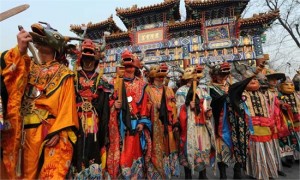Should I feel proud that Shaun Rein, in his new book The End of Cheap China, devotes two entire paragraphs to me? A two-bit blogger? Maybe I would feel proud if the two paragraphs weren’t a simple act of revenge. Maybe I would feel proud if Rein didn’t misrepresent the truth about me. Truth was never his strong suit. Let’s take a look at what he says.
The [Chinese] government sometimes overreacts to potential threats of instability. To Americans, especially those with limited knowledge of China, these measures can seem brutish. Critics like Richard Burger, a US-based blogger who lived in China for less than three years and who lasted less than a year working for the government mouthpiece newspaper The Global Times, wrote on June 26, 2011 on his blog The Peking Duck, that the government is “a giant squid, tentacles reaching across the nation to restrict all aspects of life in the land it liberated, silencing opposing voices and existing solely for its own perpetuation. Celebrate away, while people who know real freedom snicker…. and once again [it] has made a laughingstock of itself.”
Undercutting Burger’s claim that the government is a “giant squid,” the non-partisan Washington DC-based think tank Pew Research Center found in 2009 that 86 percent of the Chinese population supports the direction in which the Chinese government the country…. Chinese are generally happy with most measures implemented by the government.
Alright. First we have to consider the fact that the self-proclaimed China marketing guru is actually quoting in his book a guy who runs a blog as a hobby and who has never claimed any great knowledge of China. But if he is right, if I am just “a US-based blogger who lived in China for less than three years,” then why on earth is he quoting me in his book? Think about that. What’s going on here? Rein also left out the opening phrase of the passage he quotes from my blog: “Despite some of the good it has brought to China since opening up, the government…” This puts the sentence in a somewhat different perspective.
To be clear, I have said countless times on this blog that I am not a China expert. I lived in Greater China for about eight years, of which over three years were spent in Beijing. “Less than three years” is simply false. He could have written to me and asked. Then, we have the claim that I “lasted less than a year” at the Global Times. This makes it sound as though I was fired or was incompetent. The truth is, as all my friends know, that I left because of personal family issues, and that I left the paper on very good terms. (I always go back and visit them when I travel to Beijing — there are some very cool people who work there.) I also damaged my relationship with the paper when I blogged about their terrible attacks on Ai Weiwei. I felt I had to do it. Rein has also said on Twitter that I censored articles when I worked there. This too is outrageously false. I have never censored an article in my entire life. It is also a rather droll irony that the censors of the government Rein so admires have seen fit to ban his own book in China. Yes, The End of Cheap China has been banned in China, according to Rein’s own tweets. But that’s another story.
Shaun really loves that 2009 Pew Research poll. In the first post I ever wrote about Rein, I remarked on the appalling suckupishness of his writing and cited as evidence this quote from his infamous Forbes article on Google:
They [China’s leaders] have also seen how 30 years of economic growth brought happiness to the Chinese population. Let’s not forget that the Pew Center has found that 86% of Chinese are happy with the direction the government is taking the country.
Happy happy China. Well, as I’ve often said, many if not most Chinese people do trust their government and the CCP must be given ample credit for lifting all those millions of Chinese from poverty. But Rein, in refuting my comparison to a giant squid, writes, “If government policies were overly harsh surely they would not garner such a high rate of support.” Not true.
I will never state that the Chinese government is like the Nazi Party. It is not. But what I will say is that Nazi Germany is the greatest example of how people can be wildly supportive of their government, even though that government is a giant squid controlling society at all levels. Shaun, just because people say they are happy doesn’t mean their government is not brutal. There are countless episodes throughout history of people who blindly supported their oppressive governments. (My favorite post on this blog is all about this phenomenon.) The Chinese are “happy” with their government to the extent that they can make money and enjoy certain social freedoms. Once the economy sours, as it may well do at some point in the future, those poll numbers will be quite different. Meanwhile, there is no denying that the CCP does indeed operate as a giant squid, controlling all aspects of life in China. Sure, there are more freedoms there than ever before, but it is always on the government’s terms. You can always only go so far; there are red lines you cannot cross or the squid tightens its grip.
I took down a post I wrote about Shaun a couple of months ago because I felt it was too harsh, written in a moment of emotional pique. Now I sort of wish I’d left it up. You see, we all know Shaun Rein didn’t include me in his book because he thinks I am some great influencer with whom he disagrees. I’m just a blogger with a blog that I hardly even update anymore. No, this is revenge, pure and simple, for my having made a fool of him by quoting his own words and revealing his pattern of carrying water for the CCP. If you aren’t familiar with my coverage of Rein you can find the posts here, here and here. I am not alone in calling Rein out as a blatant apologist. China Law Blog, Modern Lei Feng, Fear of a Red Planet, China Geeks and others have all made similar arguments.
So back to the post I took down. It was about Rein’s need for revenge. My friend Lisa had written a comment critical of him in this thread. He immediately blocked her on Twitter, as he blocks anyone who doesn’t kiss his ring, and then he went to Goodreads and gave her highly praised novel, Rock Paper Tiger one star — the lowest rating there is. (The book got stellar reviews in the NY Times, the South China Morning Post, Time Out Beijing and many other media, and James Fallows of the Atlantic wrote a glowing post about it.) But here’s the thing: I will bet you my life savings that Rein never read the book. What a coincidence, that the day after his being offended and blocking Lisa on Twitter he went and tried to pull her book down in the Goodreads rankings. Did he read the entire book right after he read Lisa’s comment? Did he really find it so awful he gave it the lowest rating? No, this action, just like his attack on me in his book, is Rein getting even.
I should feel in good company, as Rein also goes after James Fallows, Paul Krugman and Nouriel Roubini, though not with nearly the same degree of viciousness he reserves for me. Once again, he proves my initial impression of him was correct: that he is deeply insecure and a serial falsifier of fact.
I had vowed not to post about Shaun Rein anymore, as I thought I had said it all. And then I discover this act of personal character assassination, this smear, and I can’t be silent about that. Rein’s book may become a bestseller but that won’t make him any less of a brat and a hatchet man.


Comments